Key takeaways:
- Understanding baking fundamentals is crucial; accurate measuring, room temperature ingredients, and proper mixing techniques greatly affect outcomes.
- Investing in essential baking tools, like a digital scale and oven thermometer, enhances precision and improves baking results.
- Developing a baking action plan that includes a clear ingredient list, timing, and contingency options helps prevent mistakes and ensures a successful baking experience.
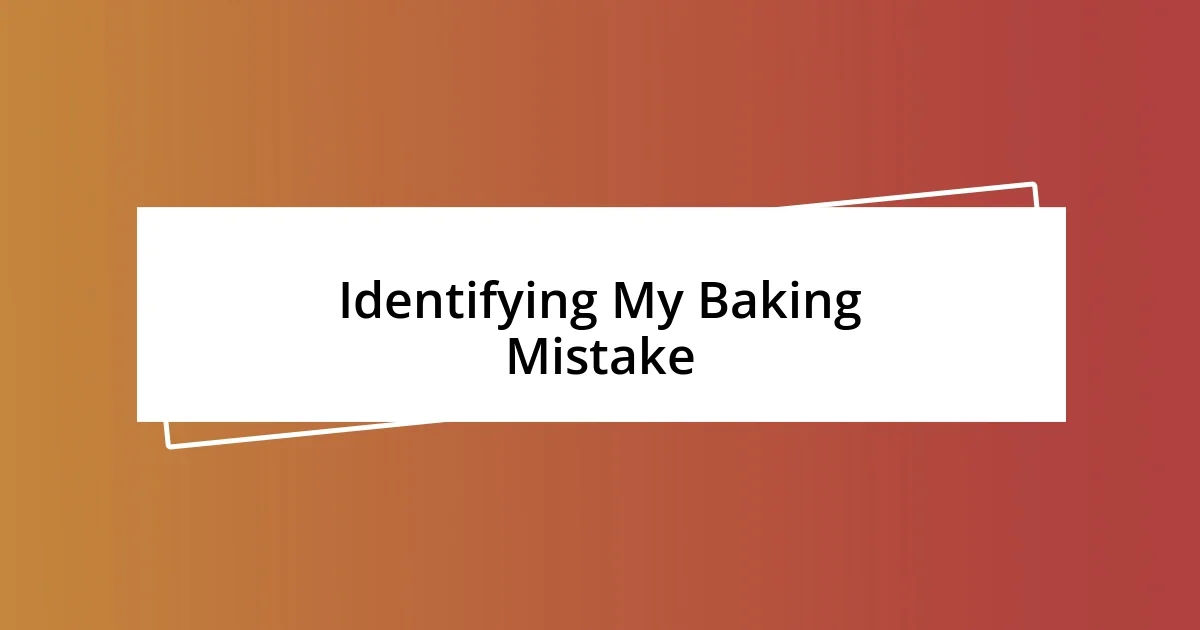
Identifying My Baking Mistake
When I first pulled that cake from the oven, I was met with a sunken top and a somewhat dense texture. I couldn’t help but wonder, had I mixed the batter too vigorously? In baking, the way you combine ingredients can significantly impact the final product, a lesson I learned the hard way.
Another critical mistake was not checking my oven’s temperature. I distinctly remember opening the oven to a waft of that ‘cooked way too long’ smell—again, a moment of realization hit me. How often do we take for granted that our tools are calibrated correctly? This experience made me rethink every assumption I had about my kitchen setup.
Ultimately, it was a combination of underestimating ingredient measurements and not following the recipe closely. I can still feel the frustration bubbling up inside as I recalled the excitement I had when starting. It was a stark reminder that precision is often key in baking; how many times have I rushed through a recipe only to learn the hard way that every step matters?
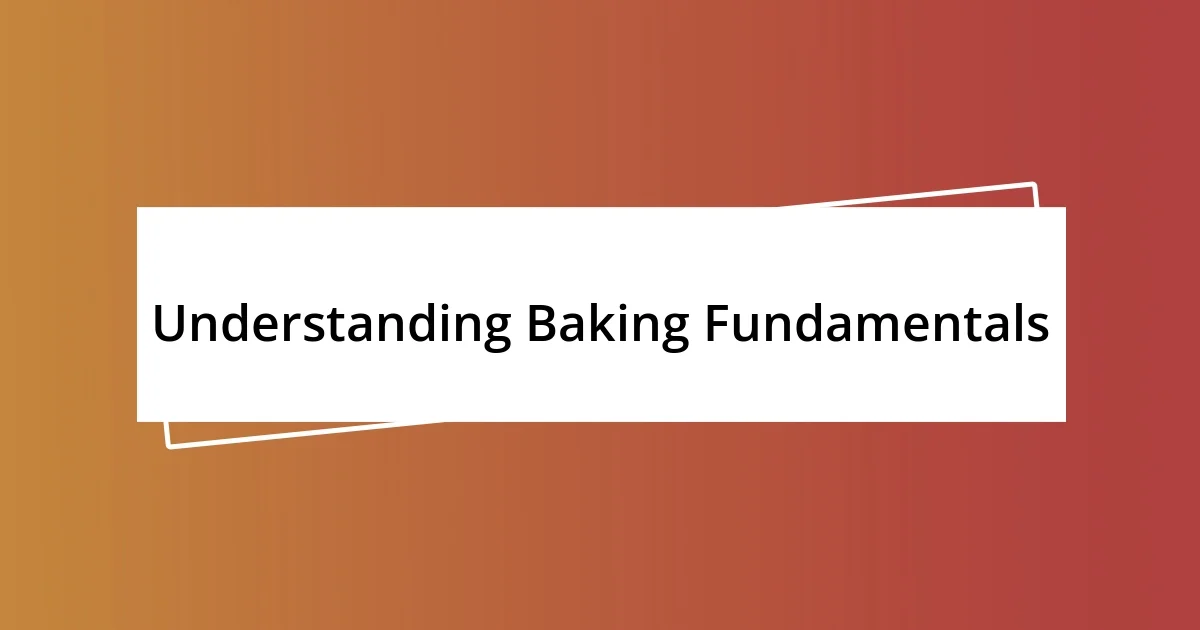
Understanding Baking Fundamentals
Understanding baking is like having a respectful conversation with your ingredients. Each element has its role, and the balance between them determines the success of your dish. Initially, I thought baking was merely about following a recipe, but it’s much deeper. I remember measuring flour with what I thought was precision—guessing and dipping in my cup. After that mishap, I learned the hard way to invest in a digital scale.
Here are some fundamental baking concepts that shaped my journey:
- Measuring Accurately: Always use the correct measuring tools—liquids for liquids and dry measures for dry ingredients—to ensure you have the right ratios.
- Room Temperature Ingredients: Some recipes call for eggs or butter to be at room temperature. This helps achieve a uniform mix and better texture.
- Oven Calibration: Preheating is crucial, and using an oven thermometer has saved me from many baking blunders.
- Mixing Techniques: Different baked goods require different methods—fold, whisk, or beat—to ensure that the right amount of air is introduced.
- Patience: Let rising dough or batter rest. I’ve often rushed through steps, only to regret it later when the end result didn’t rise to the occasion.
Fostering a deeper understanding of these fundamentals ultimately enriched my baking experience and transformed mishaps into learning milestones.
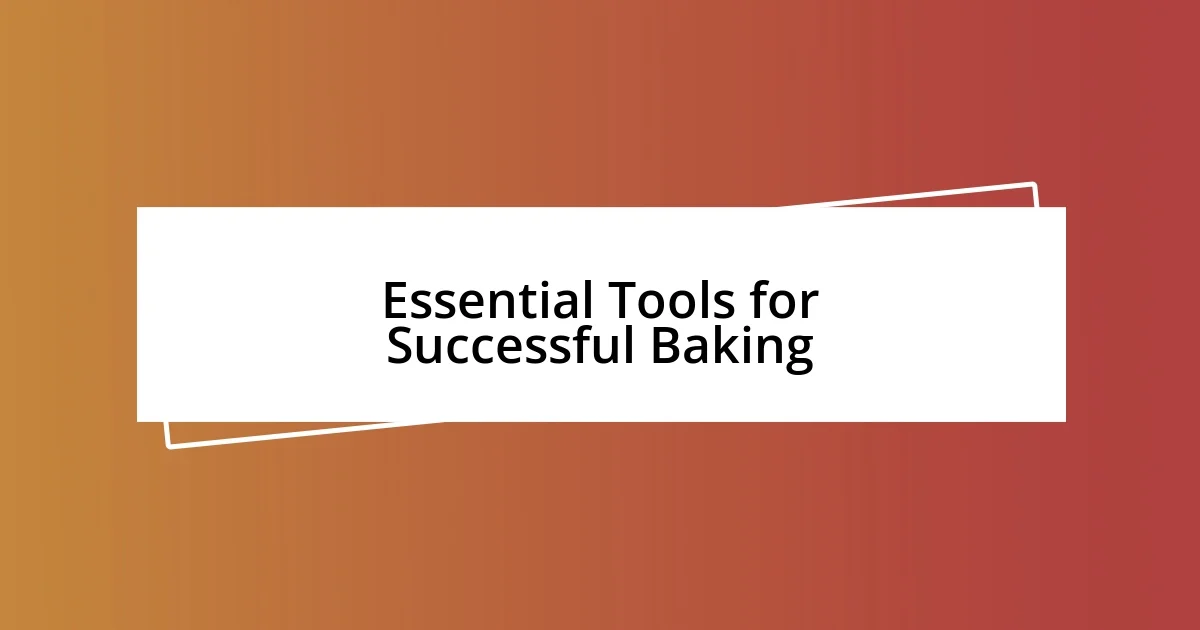
Essential Tools for Successful Baking
Equipping your kitchen with the right baking tools makes all the difference. For instance, I used to think that any old mixing bowl would suffice until I tried using a good-quality stainless steel bowl. The difference was astounding; it felt sturdier, and my ingredients mixed more evenly. Investing in solid tools isn’t just about durability; it’s about enhancing your overall baking experience.
Moreover, a reliable set of measuring cups and spoons is non-negotiable. There was a time when I relied on guesswork, and it led to a very disappointing batch of cookies. The moment I switched to clearly marked, standardized measuring tools, my baking transformed. Accuracy is crucial in this culinary art, and the right tools help you achieve that without second-guessing yourself.
| Essential Tool | Purpose and Personal Insight |
|---|---|
| Digital Scale | Ensures precise measurements, eliminating guesswork—my life changed when I stopped using cups. |
| Mixing Bowls | Sturdy bowls provide stability, allowing for easier mixing; a good stainless steel bowl made my batters feel right. |
| Oven Thermometer | Verifies oven temperature, preventing baking disasters. I’ve saved countless cupcakes from overbaking with this tool! |
| Spatulas | Essential for folding and scraping. Choosing the right one can change the way you mix ingredients! |
| Baking Sheets | Even heat distribution is key; investing in heavy-duty sheets has led to perfectly browned cookies. |
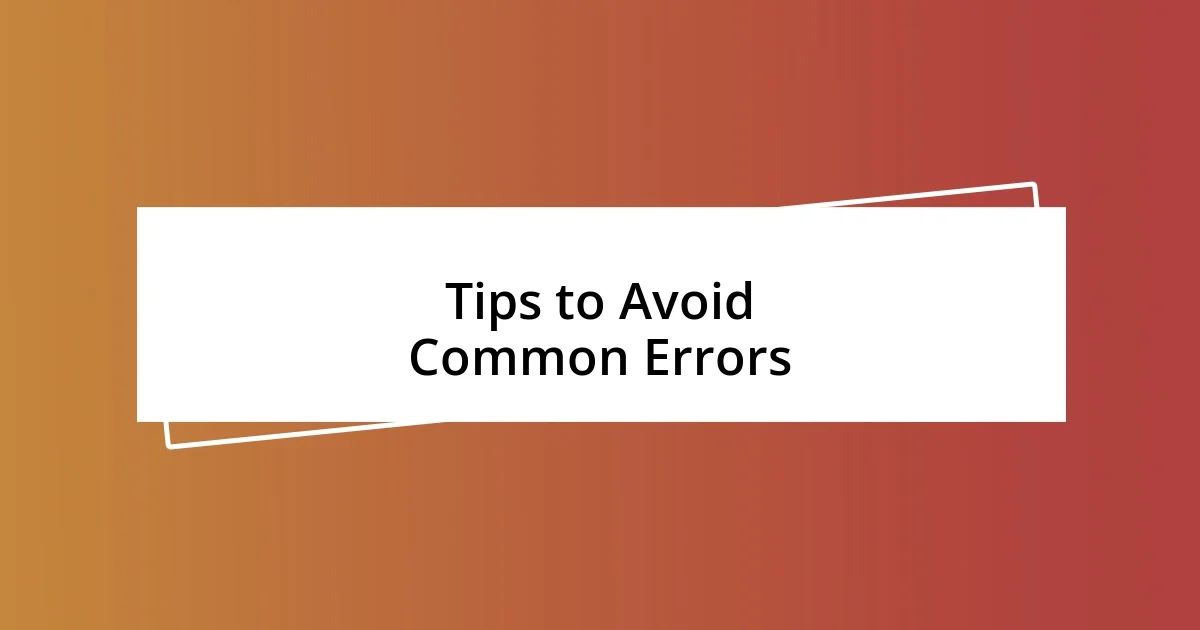
Tips to Avoid Common Errors
When it comes to measuring accurately, I can’t stress enough how much it matters. I vividly remember attempting to bake a cake with what I thought was the right amount of flour, but my estimation led to a dense disaster. Since then, I’ve realized that investing in a digital scale was not just a luxury; it became my ally in the kitchen. Have you ever wondered why your baked goods turn out inconsistent? It often boils down to how precisely you measure those ingredients.
Another crucial aspect is ensuring your ingredients are at room temperature. I used to toss cold butter straight from the fridge into my batter, assuming it wouldn’t make much of a difference. Let me tell you, the texture that resulted was far from ideal. Now, I check my eggs and butter ahead of time, allowing them to sit out for a bit. This simple habit has made a significant difference, achieving that silky mix I once struggled to attain.
Don’t underestimate the importance of oven calibration, either. I can recall a time when my cookies emerged as burnt little bricks, and it took a frustrating experimentation phase to understand why. The culprit? A faulty oven thermostat. I now use an oven thermometer to ensure my baked goods are exposed to the right temperature, and that extra step has spared me from endless culinary regret. Isn’t it amazing how a small change in your routine can lead to such delightful results?

Learning from My Experience
Learning from my experience has taught me that every baking mishap carries a valuable lesson. For instance, I once whisked my dry ingredients together, thinking I was all set, only to discover later that I had missed the baking powder. It turned what could have been a light and fluffy cake into an almost edible brick! That moment hit hard; I realized how crucial it is to double-check your ingredients before diving into the mixing bowl. Have you ever experienced that sinking feeling during a bake? I learned the hard way that you can’t rush love in the kitchen.
Another revelation came to me during a particularly chaotic baking session. I had my mind on multiple things and decided to use the microwave instead of the stove to melt my butter. Let’s just say that melted butter can quickly turn into something less than desirable when left unattended. The result was a bubbling mess that nearly ruined my evening. Now, I approach ingredient preparation with more mindfulness. Slow and steady really does win the race when it comes to baking, don’t you think?
Lastly, the importance of patience became evident when I impatiently took my cake out of the oven too soon. I was so eager to share my creation that I couldn’t wait for it to cool. The result? A deflated, sad excuse for what should have been a glorious dessert! I’ve since learned that giving baked goods the time they need makes all the difference. So, if you’re ever tempted to rush, remember, the best bakes often come from a place of patience and care. Isn’t that a comforting thought?
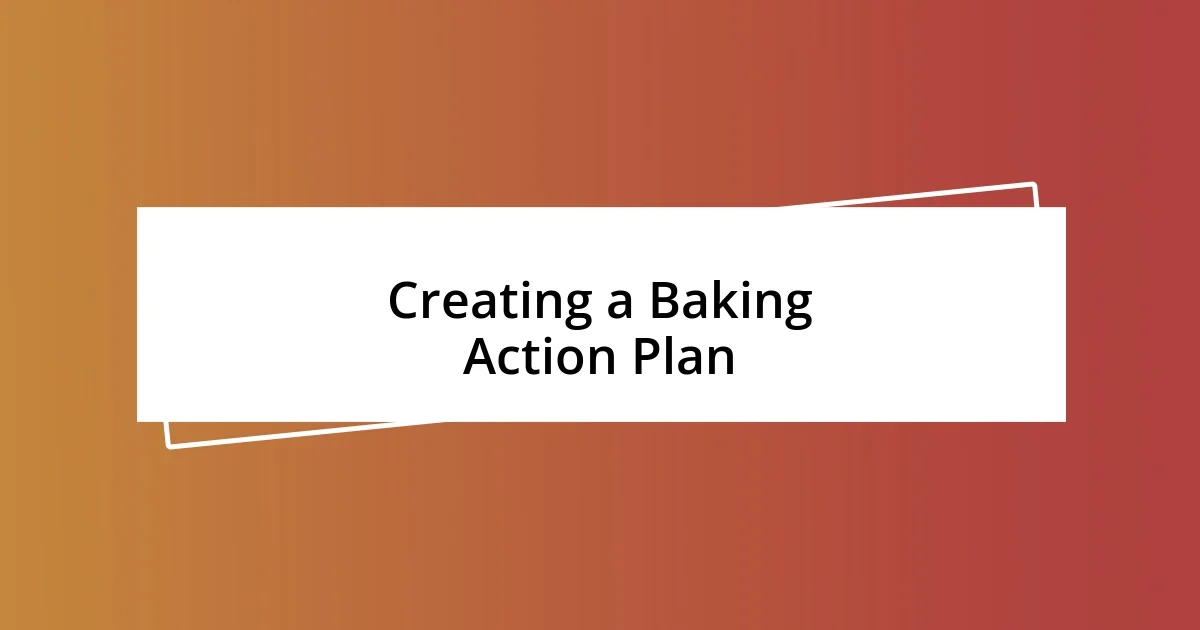
Creating a Baking Action Plan
Creating a baking action plan might sound a bit formal, but it’s really about setting yourself up for success in the kitchen. When I map out my baking sessions, I begin with a clear list of ingredients, not just in my head but on paper. I once embarked on baking brownies and, in my haste, forgot about the chocolate. That’s a mistake I’ll never make again—now, I check my list twice before I even preheat the oven.
Another element I’ve found crucial is timing. Beyond just baking times, I keep a close eye on preparation steps. I’ll admit, I used to think timing was a loose guideline, but I’ve learned the hard way that precision matters. For instance, I once thought I could quickly mix my batter while the oven preheated. Sounds harmless, right? Well, it resulted in a weird, half-cooked, gooey mess. Now I allow myself ample prep time, ensuring everything is ready to go before I start mixing. Trust me, it’s a game changer.
Lastly, I always include a contingency plan. There’s something about baking that can be unpredictable—or maybe that’s just my experience talking! I remember running low on eggs for a recipe and panicking, thinking I would have to scrap my plans. Instead, I turned to my trusty internet friends for a substitute and learned about using applesauce. It worked, and the brownies turned out delightful! Having alternatives at your fingertips can turn a potential disaster into an unexpected win. It adds a bit of adventure, don’t you think?














